中考英语 语法专题复习4 代词 仁爱版
仁爱版初中英语代词专项复习
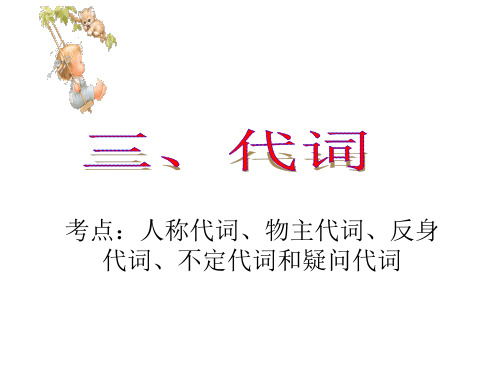
三、反身代词:与self(单数)、selves(复数) 1.常考词组: enjoy oneself 玩得开心 help oneself to sth.随便吃点什么 四、指示代词:this\these(近指) that\those(远指)
this\that (单数)+名词+Vs these\thoes(复数)+名词s+V 介绍某人:this is sb. 打电话用语:This is sb.我是谁。 Who is that ?你是谁?
考点:人称代词、物主代词、反身 代词、不定代词和疑问代词
一、人称代词:主格和宾格 1.主格做主语,宾格做宾语 2.动宾介宾:动词后面加宾格,介词后面加宾格 二、物主代词:形容词性物主代词和名词性物主代词
1.形容词性物主代词表示某人的,当作形容词,不能单 独使用,后面一定要加名词,只能作定语。 2.名词性物主代词表示某人的东西,当作名词可以单独 使用,后面不加名词,可以作主语,宾语。 3.形容词物主代词+名词=名词性物主代词 eg:This is my book.=This is mine.
5.关于other的用法
1)The other:另一个(两者之间)句型:one…the other… 2)The others:全部(指三个或三个以上剩下的全部) 3)other(其他的,形容词)与others (其他人\物,名词): other+名词=others 4)another:另外一个(三者或三者以上)another+数字:另外几个
4.词组
1)both of sb.两者都,谓语动词是原形\复数,表肯定(两者) 2)neither of sb.两者都不,谓语动词是单数,表否定(两者) 3)all of sb.全部都,谓语动词是原形\复数,表肯定(三者上) 4)none of sb.全部都不,谓语动词是原形\复数,表否定(三者上) 5)either of sb.两者其中之一,谓语动词是单数,表肯定(两者之一)
2024年福建省仁爱版中考英语二轮复习课件专题4 代词

“可以拿走两者中的任何一本”。
3. (2023•扬州改编)The children have painted since __A__ could first pick up a
brush.
A.they
B.them
C.their
【解析】考查人称代词主格的用法。they“他(她、它)们”,人称代词主 2021[文件:中教联标彩.t]
shyness, Tom. 2021[文件:中教联标彩.t]
7. I like those shoes! When I get my pocket money, I will buy _t_h_e_m__(they).
She,对应的反身代词是herself, teach oneself意为“自学”。
2.(2023•泸州改编)—There are two books about Chinese traditional tea-
making culture.
—You're free to take __B__ of them and leave one for me.
者都不”; either“两者中的任何一个”。由题干中“All the students are
playing on the playground.”可知,此处指三者以上,句意为“所有的学生
正在操场上玩”,那么他们是没有一个人在教室里的。
9.—Would you like to do __C__ with us this weekend, Amy? Do you have any
very excited.
A.him
B.her
C.us
根据所给单词的提示,在空格内填入一个恰当的词。 4.Students should learn some living skills to take good care of __t_h_e_m_s_e_lv_e_s__ (they). 5.I took many photos in the p2a0r2k1[.文I件w:i中ll教s联ho标w彩._t]t_h_e_m__ (they) to my classmates next week.
仁爱初中英语代词讲解与练习

代词的讲解与练习题代词可以分为以下七大类:人称代词同学们,你们知道吗?随着超女和快男在全国各地如火如荼地展开,我们熟悉的人称代词现在也站在舞台上了呢!来听听它们说什么吧:【No1】我们的分类:我们人称代词分为主格和宾格。
具体如下:主格有八个: I,you(你),_____,she,it,_____,you(你们),_____。
宾格也有八个:_____,you(你),him,_____,it,us,_____(你们),them。
[答案揭秘] he,we,they,me,her,you。
【No2】我们的用法“句子主语用主格,动、介词后接宾格”,听说过吗?这便是我们的用法了!来给你们解释一下吧:主格:在句子中只能作主语,通常放在句子开头,即谓语动词的前面。
主格常常与谓语动词在人称和数等方面保持一致。
如:She was at school yesterday. 她昨天在学校里。
They all like listening to Mr. Guo’s English class. 他们都喜欢听郭老师的英语课。
宾格:在句子中常常作宾语,偶尔也作表语,具体用在:1) 及物动词的后面用在及物动词give, pass, take, buy, tell, like等词的后面,作宾语。
如:My father often tells me some interesting stories. 爸爸经常给我讲一些有趣的故事。
Mum, can you take us to the Congtai Park tomorrow?妈妈,明天你能带我们去丛台公园吗?2) 介词的后面介词不单独使用,其后面常常接宾语,那么,宾格就常常用在介词:in, on, under, to, at, behind, between, for, of 等词的后面。
如:What about them? 他们怎么样?You must look after her. 你必须照顾她。
仁爱版英语中考语法考点及精练
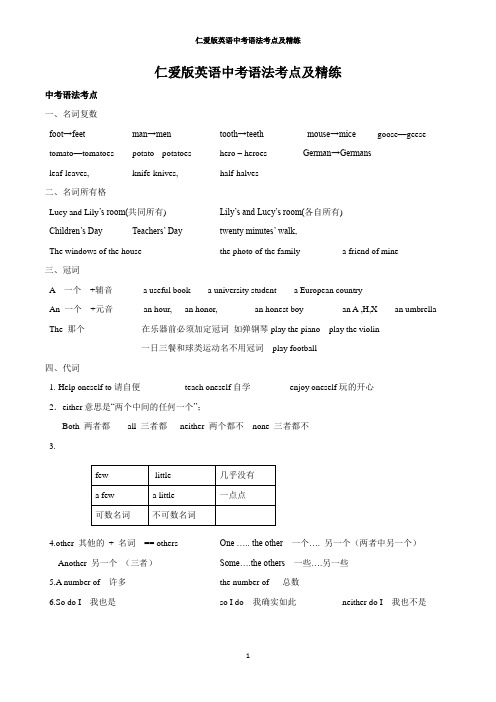
仁爱版英语中考语法考点及精练中考语法考点一、名词复数foot→feet man→men tooth→teeth mouse→mice goose—geese tomato—tomatoes potato-- potatoes hero – heroes German→Germansleaf-leaves, knife-knives, half-halves二、名词所有格Lucy and Lily’s room(共同所有) Lily’s and Lucy’s room(各自所有)Children’s Day Teachers’ Day twenty minutes’ walk,The windows of the house the photo of the family a friend of mine三、冠词A 一个+辅音 a useful book a university student a European countryAn 一个+元音an hour, an honor, an honest boy an A ,H,X an umbrella The 那个在乐器前必须加定冠词如弹钢琴play the piano play the violin一日三餐和球类运动名不用冠词play football四、代词1.Help oneself to请自便teach oneself自学enjoy oneself玩的开心2.either意思是“两个中间的任何一个”;Both 两者都all 三者都neither 两个都不none 三者都不3.4.other 其他的+ 名词== others One ….. the other 一个…. 另一个(两者中另一个)Another 另一个(三者)Some….the others 一些….另一些5.A number of 许多the number of 总数6.So do I 我也是so I do 我确实如此neither do I 我也不是五.数词1.基数词—序数词one—first two—second three—third eight—eighth nine—ninth twelve—twelfth twenty—twentieth twenty-one –-twenty-first2.分数的表达:分子(基数)、分母(序数)one third 三分之一 two thirds 三分之二3. hundreds of成百上千; thousands of成千上万two hundred两百六.介词1.in; on; at用在时间词前,表“在”1)at + 具体时刻at 6:00 2)on + 具体某天On Monday on 11th June 1998 on Sunday morning3)in + 年、月、季节及一天中的某部分2.in , on , to表方位in(范围内);on(范围外且接壤);to(范围外但不接壤)。
仁爱版初中英语语法(归纳)

仁爱版初中英语语法一.名词I. 名词的种类:II. 名词的数:1. 规则名词的复数形式:名词的复数形式,一般在单数形式后面加-s或-es。
现将构成方法与读音规则列表如下:2. 不规则名词复数:英语里有些名词的复数形式是不规则的,现归纳如下:III. 名词的所有格:名词在句中表示所有关系的语法形式叫做名词所有格。
所有格分两种:一是名词词尾加’s构成,二是由介词of加名词构成。
前者多表示有生命的东西,后者多表示无生命的东西。
1. ’s所有格的构成:2. ’s所有格的用法:3. of所有格的用法:用于无生命的东西:the legs of the chair, the cover of the book用于有生命的东西,尤其是有较长定语时:the classrooms of the first-year students用于名词化的词:the struggle of the oppressed二.冠词冠词分为不定冠词(a, an),定冠词(the),和零冠词。
I. 不定冠词的用法:II. 定冠词的用法:III. 零冠词的用法:三.代词:I. 代词可以分为以下七大类:II. 不定代词用法注意点:1. one, some与any:1) one可以泛指任何人,也可特指,复数为ones。
some多用于肯定句,any多用于疑问句和否定句。
One should learn to think of others.Have you any bookmarks? No, I don’t have any bookmarks.I have some questions to ask.2) some可用于疑问句中,表示盼望得到肯定的答复,或者表示建议,请求等。
Would you like some bananas? Could you give me some money?3) some 和any修饰可数名词单数时,some表示某个,any表示任何一个。
中考仁爱英语知识点总结

中考仁爱英语知识点总结一、语法知识点1. 时态英语中一般有现在时态、过去时态和将来时态。
表示时间的方法有二:1)动词的词形变法;2)助动词will, shall, be, have等的变化。
特别需要注意的时态有现在进行时态、现在完成时态、过去进行时态、过去完成时态和将来完成时态等。
2. 语态英语中有被动语态。
表示被动的动作或状态由动作的承受者而不是动作的执行者自主承担。
被动句的结构为be(p.p.)+其他成分。
3. 语法成分英语句子的成分包括主语、谓语、宾语、定语、状语等。
需要掌握各种成分的构成和用法。
4. 从句从句有名词性从句、定语从句和状语从句。
掌握从句的引导词,从句的结构和从句的用法。
5. 倒装句英语的倒装句有全部倒装和部分倒装。
需要特别注意的有强调句的倒装和条件句位于句首时的倒装。
6. 词义辨析英语中有许多近义词汇,如live和reside; big和large;true和real等。
需要能正确辨析这些词汇的用法。
7. 词性转换英语中有许多词汇的词性可以转换,如名词转动词,动词转形容词等。
需要了解转换词汇的规律。
二、词汇知识点1. 词汇量需要掌握一定的词汇量,不仅要积累常用词汇,还要注意学习一些考试中常见的专门词汇。
2. 同义词和近义词对于同义词和近义词的区别和用法要有一定的了解和掌握。
3. 词组和短语掌握一些常用的词组和短语,能够正确使用它们。
4. 词汇拼写和词形变化掌握常见词汇的拼写和词形变化规律。
5. 词组和短语的辨析有些词组和短语意思相近,但用法不同,需要特别注意。
6. 派生词掌握一些常见的派生词,能够正确使用它们。
三、阅读技能1. 理解文章通过阅读文章的主旨和内容,能够理解文章的主要意思。
2. 确定词义通过文章上下文的提示,可以猜测词义。
3. 理解细节能够找出文章中的关键信息和细节,并对其进行理解。
4. 推理判断通过文章的内容进行推理判断,能够对文章进行分析和思考。
5. 阅读理解题型掌握不同类型的阅读理解题型,包括选择题、判断题、填空题等。
仁爱英语九年级上册Unit4知识点总结--By-Willa
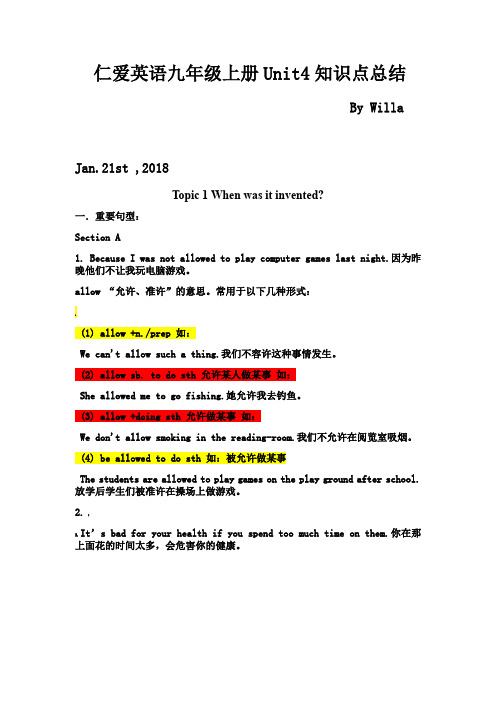
仁爱英语九年级上册Unit4知识点总结By WillaJan.21st ,2018Topic 1 When was it invented?一.重要句型:Section A1. Because I was not allowed to play computer games last night.因为昨晚他们不让我玩电脑游戏。
allow “允许、准许”的意思。
常用于以下几种形式:.(1) allow +n./prep 如:We can't allow such a thing.我们不容许这种事情发生。
(2) allow sb. to do sth 允许某人做某事如:She allowed me to go fishing.她允许我去钓鱼。
(3) allow +doing sth 允许做某事如:We don't allow smoking in the reading-room.我们不允许在阅览室吸烟。
(4) be allowed to do sth 如:被允许做某事The students are allowed to play games on the play ground after school.放学后学生们被准许在操场上做游戏。
2.;3.It’s bad for your health if you spend too much time on them.你在那上面花的时间太多,会危害你的健康。
(1)(2) A. too much太多既是形容词短语,也是副词短语,所以too much它既可以修饰不可数名词,也可以用来修饰动词。
too much water 太多的水; eat too much 吃得太多;B. too many修饰可数名词的复数形式。
much too 是“很,太”,修饰形容词或是副词。
He shouldn't walk too much. 他不应该走太多路。
初中仁爱英语语法——代词(共33张PPT)

(3)反身代词用在be,feel,look,seem等连系 动词后作表语,表示身体或精神状态处于正常。如: I’m not myself today.我今天感觉不舒服。
He is feeling himself again.他觉得自己健康如 初。
(4)反身代词还用于一些固定词组或简短会话中。 如:
You and Lily must come over to m y house and see.你和莉莉一定要到我家来看看。
We,you and they have been to the Great Wall.我 们,你们和他们都去过长城。
物主代词
1.物主代词的概念与形式
物主代词是 表示所有关系的代词,即“你的”、“我 的”、“他的、她的、它的”及其复数“我们的”、“你 们的”、“他们的”;物主代词有形容词物主代词和名词 性物主代词两种形式。第二人称单数和复数同形,都是 your和yours;第三人称单数his,its的形容词性和名词 性同形,都是his,its。
2. 常考易混不定代词的用法 (1)none和no one none与数量有关,可以用来回答how many,表示“一 个也没有”,而no one表示“什么人也没有”,可用来 回答who。如: —How many people went there?多少人去了那里? —None.一个人也没有。 —Who was late today?今天谁迟到了? —No one.谁也没有迟到。
反身代词
1.反身代词的概念与形式
表示“我自己,你自己,他(她、它)自己,我们 自己,你们自己,他们自己”的代词称为反身代词。 第一、二人称是在形容词性物主代词后加self或 selves构成,第三人称是在人称代词宾格后加self 或selves构成。
中考英语复习专题(四)代词
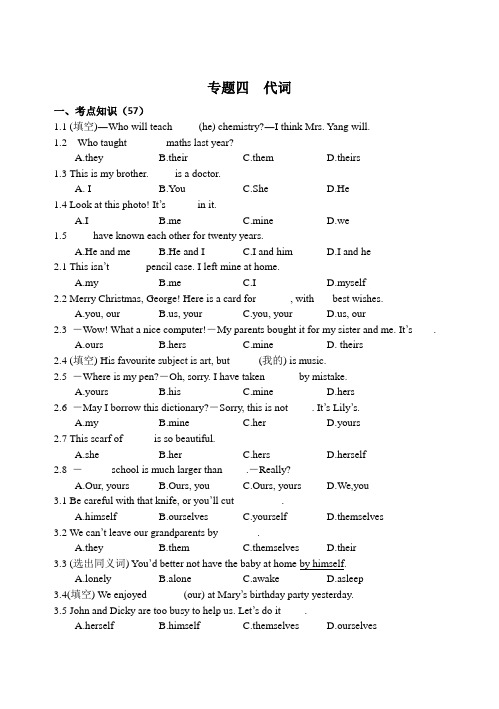
专题四代词一、考点知识(57)1.1 (填空)―Who will teach ____ (he) chemistry?―I think Mrs. Yang will.1.2 Who taught _______maths last year?A.theyB.theirC.themD.theirs1.3 This is my brother. ____ is a doctor.A. IB.YouC.SheD.He1.4 Look at this photo! It’s _____ in it.A.IB.meC.mineD.we1.5 ____ have known each other for twenty years.A.He and meB.He and IC.I and himD.I and he2.1 This isn’t ______ pencil case. I left mine at home.A.myB.meC.ID.myself2.2 Merry Christmas, George! Here is a card for ______, with___ best wishes.A.you, our, yourC.you, your, our2.3 ―Wow! What a nice computer!―My parents bought it for my sister and me. It’s____.A.oursB.hersC.mineD. theirs2.4 (填空) His favourite subject is art, but _____(我的) is music.2.5 ―Where is my pen?―Oh, sorry. I have taken ______by mistake.A.yoursB.hisC.mineD.hers2.6 -May I borrow this dictionary?-Sorry, this is not ____. It’s Lily’s.A.myB.mineC.herD.yours2.7 This scarf of _____ is so beautiful.A.sheB.herC.hersD.herself2.8 ―_____ school is much larger than ____.―Really?A.Our, yoursB.Ours, youC.Ours, yoursD.We,you3.1 Be careful with that knife, or you’ll cut _______.A.himselfB.ourselvesC.yourselfD.themselves3.2 We can’t leave our grandparents by _______.A.theyB.themC.themselvesD.their3.3 (选出同义词) You’d better not have the baby at home by himself.A.lonelyB.aloneC.awakeD.asleep3.4(填空) We enjoyed ______ (our) at Mary’s birthday party yesterday.3.5 John and Dicky are too busy to help us. Let’s do it ____.A.herselfB.himselfC.themselvesD.ourselves3.6 You can’t finish the work ____ . Let me give you a hand.A.youselfB.yourselfC.by youD.you only3.7 Yesterday I saw____ enjoy_____ in the park.A.her, hersB.they,themC.she,herselfD.them,themselves3.8 Children, don’t be so pleased with ___ . Be careful.A.yourselfB.yourselvesC.herselfD.themselves4.1 (填空) Look at _____ (that) boys! They are playing soccer.4.2 ―Hello!______is Jim speaking. Who______?―Hello! _____ Carol.A.This,is that, This isB.This, is that, I’mC. That, are you, I’mD.He, are you, I’m4.3 ―I’m sorry, I’m calling you so late.―____ OK.A.This isB.You’reC.That’sD.I’m4.4 The grapes growing in this area are sweeter than ____ growing in the south.A.onesB.thoseC.themD.grapes4.5 The shoes made in Wenzhou are as beautiful as ____ made in Hong Kong.A.thisB.thatC.theseD.those4.6 ―Hello, Betty!―Hello, Lucy! ____ is my good friend Linda.A.TheB.ThisC.SheD.These5.1 ―Which of the three ways shall I take to the village?―____way as you like.A.EachB.EveryC.AnyD.Either5.2 ―I feel a bit hungry.―Why don’t you have _____ bread?A.someB.anyC.little5.3 We have only a sofa, a table and a bed in our apartment. We need to buy _____ more furniture.A.anyB.manyC.littleD.some5.4 ―When shall we meet again?―Make it ______day you like, it’s all the same to me.A.oneB.anyC.anotherD.some用many, much和a lot of 填空。
仁爱版英语中考常考知识点整理
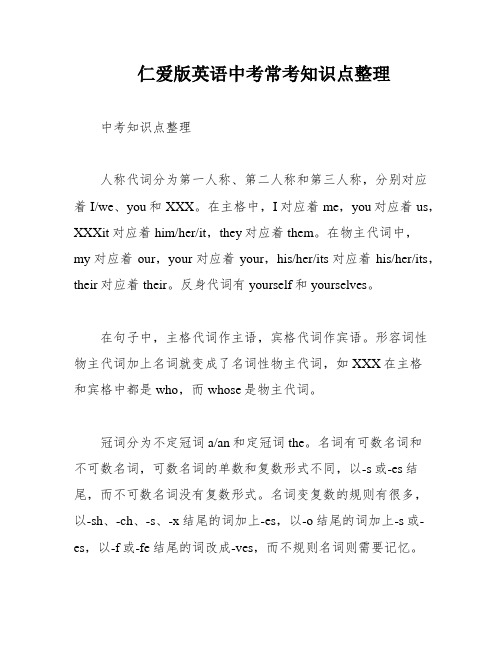
仁爱版英语中考常考知识点整理中考知识点整理人称代词分为第一人称、第二人称和第三人称,分别对应着I/we、you和XXX。
在主格中,I对应着me,you对应着us,XXXit对应着him/her/it,they对应着them。
在物主代词中,my对应着our,your对应着your,his/her/its对应着his/her/its,their对应着their。
反身代词有yourself和yourselves。
在句子中,主格代词作主语,宾格代词作宾语。
形容词性物主代词加上名词就变成了名词性物主代词,如XXX在主格和宾格中都是who,而whose是物主代词。
冠词分为不定冠词a/an和定冠词the。
名词有可数名词和不可数名词,可数名词的单数和复数形式不同,以-s或-es结尾,而不可数名词没有复数形式。
名词变复数的规则有很多,以-sh、-ch、-s、-x结尾的词加上-es,以-o结尾的词加上-s或-es,以-f或-fe结尾的词改成-ves,而不规则名词则需要记忆。
名词所有格可以用-’s或-s’表示,也可以用连字符表示。
动词包括be动词、实义动词、助动词和情态动词。
情态动词有can、could、will、would、need、dare、must、should、have/has to和may等。
它们分别表示能力、可能、应该等情态。
Corrected and Rewritten:XXX。
XXX。
while needn’t means it is not necessary or you don’t have to。
For negative XXX…。
you can say “No。
you needn’t” or “No。
you don’t have to”。
Dare expresses willingness or courage。
while will XXX any modal verb should be in its base form.Causative verbs are used to express the idea of making orXXX do something。
中考英语语法专题详解四:代词

中考英语语法专题详解四:代词专题四代词一、代词概述代词是代替名词的一种词类。
大多数代词具有名词和形容词的功能。
二、代词分类英语中的代词,按其意义、特征及在句中的作用主要分为:人称代词、物主代词、反身代词、指示代词、不定代词、疑问代词。
1、人称代词及其用法1)人称代词主格和宾格人称单、复数主格宾格第一人称单数Ime复数weus第二人称单数youyou复数youyou第三人称单数hehimsheheritit复数theythem2) 人称代词的用法① 人称代词主格在句子中担任主语。
例如:She likes watching movies.她喜欢看电影。
They have been to America twice他们到过美国两次。
② 人称代词宾格在句子中担任动词宾语、介词宾语或表语。
例如: We listen to them and they help us.我们听他们,他们帮我们。
---Who is knocking at the door? --It’s me.—谁在敲门?—是我。
2、物主代词及其用法1)形容词性和名词性物主代词人称单、复数形容词性名词性词义第一人称单数my mine 我的复数our ours 我们的第二人称单数your yours 你的复数your yours 你们的第三人称单数hishis 他的her hers 她的itsits 它的复数their theirs2)物主代词的用法① 形容词性物主代词相当于形容词,在句子中担任定语修饰名词,一般不单独使用。
例如:This is my book. Your book is over there.这是我的书。
你的书在那里。
They are our new friends.他们是我们的新朋友。
②名词性物主代词语法上相当于名词,意义上相当于“形容词性物主代词+名词”,经常用其来避免和前面提到的名词重复。
例如:This is my dictionary. Where is yours (=your dictionary)?这是我的词典。
仁爱版英语九年级上册Unit4语法复习

03 时间介词
时间前所用介词的速记歌 年月周前要用in,日子前面却不行。 遇到几号要用on,上午下午又是in。 要说某日上下午,用on换in才能行。 午夜黄昏须用at,黎明用它也不错。 at也用在时分前,说“差”可要用上to。 说“过”只可使用past,多说多练牢牢记, 莫让岁月成蹉跎。
04
定语从句 关系代词
分词作宾语补足语可分为两种情况
animals
be
kept
under
the
sea?
动物将会被养在海底吗?
3.情态动词的被动语态 情态动词的被动语态由“情态动词+be+及物动词的过去分 词”构成。如: (1)Aliens can not be seen on the earth. 在地球上不可 能见到外星人。 (2)Other planets may be visited soon in the future. 将来其他的星球也会有人登陆。(3)Scientific research should be done carefully. 应该认真地进行科学研究。 (4)These trees must be watered in time. 这些树应该及 时浇水。
2.动词不定式作宾语补足语可分为三种情况 (1)跟带to的不定式作宾语补足语。 常见的这类动词有:ask, tell, get, teach, want, invite, like, allow, wish, encourage等。 如:Tell Jane to sing us a song. 叫简给我们唱支歌。
Thank you!
关系词 作用 能否省略 先行词 例句
whothat 主语 否
whichth 主语 否 at that 主语 否
中考英语代词A4版

中考英语复习与练习专题二:代词代词,是代替名词或一句话的一种词类。
大多数代词具有名词和形容词的功能。
英语中的代词,按其意义、特征及在句中的的作用,代词分为:人称代词、物主代词、反身代词、关系代词、指示代词、疑问代词、连接代词、不定代词和相互代词等。
而在中考中,人称代词、物主代词、反身代词、指示代词则作为重点考查内容。
I、人称代词、物主代词和反身代词一、人称代词1、人称代词的主格和宾格,其具体内容如下表:(1)人称代词的主格在句中充当主语。
如:She is a good student.(2)人称代词的宾格在句中充当动词、介词的宾语或表语。
如:I don't know her.(作宾语)His molther is waiting for him outside.(作宾语)—Who is there?-It's me!(作表语)3.人称代词的语序几个人称代词并列充当主语时,它们的顺序是:单数形式(二、三、一)you, he/she and I复数形式(一、二、三)we, you and they二、物主代词1. 物主代词分为形容词性物主代词和名词性物主代词,列表如下:His parents are both office workers,My name is Jack.3.名词性物主代词后面不需要加名词,相当于“形容词性物主代词+名词”。
如:My idea is quite diferent from hers.4.名词性物主代词可与of连用,表示部分概念或带有一定的感情色彩。
如:He is a friend of mine.(我的一个朋友)三、反身代词1、反身代词的单复数形式如下表:反身代词与它所指代的名词或代词在人称、性别、数上保持一致。
I hope you can enjoy yourselves at the party.(作宾语)The children made model planes themselves.(作同位语)3、反身代词的常用词组teach oneself自学learn by oneself自学enjoy oneself过得愉快;玩得高兴help oneself to 随便吃/用come to oneself苏配hurt oneself受伤by oneself独自II、不定代词和其他代词一、不定代词(一)常用不定代词有;some、something、somebody、someone、any、anything、anybody,anyone,no、nothing、nobody、no one,al、each,both、much、many、(a)little、(a)few、other(s)、another、none、one、either、neither等。
2024年仁爱版中考英语复习句子成分及词性
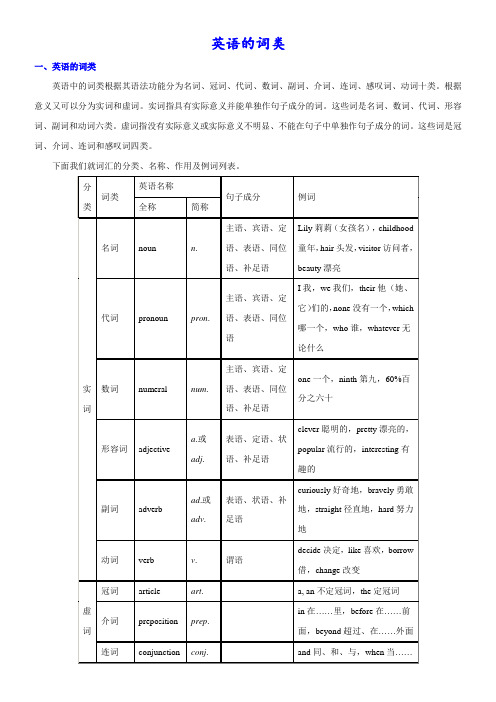
英语的词类一、英语的词类英语中的词类根据其语法功能分为名词、冠词、代词、数词、副词、介词、连词、感叹词、动词十类。
根据意义又可以分为实词和虚词。
实词指具有实际意义并能单独作句子成分的词。
这些词是名词、数词、代词、形容词、副词和动词六类。
虚词指没有实际意义或实际意义不明显、不能在句子中单独作句子成分的词。
这些词是冠词、介词、连词和感叹词四类。
下面我们就词汇的分类、名称、作用及例词列表。
句子成分与句子的种类第一部分句子的成分构成句子的各个部分叫做句子成分。
英语的句子成分包括主语、谓语、表语、宾语、定语、状语、补足语和同位语。
现简单回顾如下:1.主语:主语是一个句子所叙述的主体,一般位于句首。
但在there be结构、疑问句(当主语不疑问词时)和倒装句中,主语位于谓语、助动词或情态动词后面。
主语可由名词、代词、数词、不定式、动名词、名词化的形容词和主语从句等表示。
例如:2.谓语:谓语说明主语所做的动作或具有的特征和状态。
动词在句中作谓语,一般放在主语之后。
谓语的构成如下:1、简单谓语:由一个动词或动词短语构成。
如:He practices running every morning.2、复合谓语:(1)由情态动词或其他助动词加动词原形构成。
如:You may keep the book for two weeks.(2)由系动词加表语构成。
如:We are students.3.表语:表语用以说明主语的身份、特征和状态,它一般位于系动词(如be, become, get, look, grow, seem等)之后。
表语一般由名词、代词、形容词、分词、数词、不定式、动名词、介词短语表示。
4.宾语:宾语表示动作的对象或承爱者,一般位于及物动词和介词后面。
例如:宾语种类:(1)双宾语(间接宾语+直接宾语),例如:Lend me your dictionary, please.(2)复合宾语(宾语+宾补),例如:They elected him their monitor.5.宾语补足语:英语中有些及物动词,除有一个直接宾语以外,还要有一个宾语补语,才能使句子的意义完整。
九年级仁爱英语同步语法Unit4
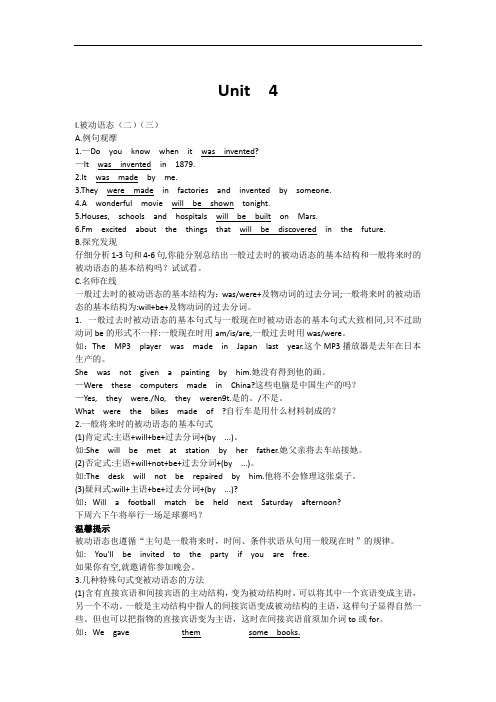
Unit 4I.被动语态(二)(三)A.例句观摩1.—Do you know when it was invented?—It was invented in 1879.2.It was made by me.3.They were made in factories and invented by someone.4.A wonderful movie will be shown tonight.5.Houses, schools and hospitals will be built on Mars.6.Fm excited about the things that will be discovered in the future.B.探究发现仔细分析1-3句和4-6句,你能分别总结出一般过去时的被动语态的基本结构和一般将来时的被动语态的基本结构吗?试试看。
C.名师在线一般过去时的被动语态的基本结构为:was/were+及物动词的过去分词;一般将来时的被动语态的基本结构为:will+be+及物动词的过去分词。
1.一般过去时被动语态的基本句式与一般现在时被动语态的基本句式大致相同,只不过助动词be的形式不一样:一般现在时用am/is/are,一般过去时用was/were。
如:The MP3 player was made in Japan last year.这个MP3播放器是去年在日本生产的。
She was not given a painting by him.她没有得到他的画。
—Were these computers made in China?这些电脑是中国生产的吗?—Yes, they were./No, they weren9t.是的。
/不是。
What were the bikes made of ?自行车是用什么材料制成的?2.一般将来时的被动语态的基本句式(1)肯定式:主语+will+be+过去分词+(by ...)。
仁爱版七年级英语复习材料四人称代词和物主代词
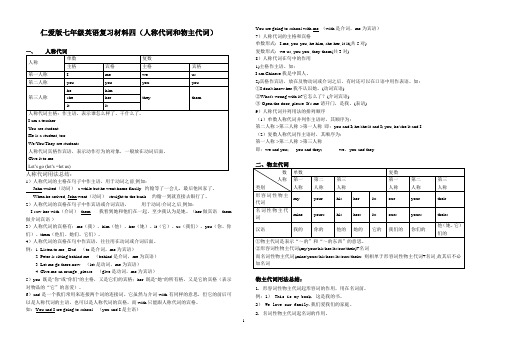
仁爱版七年级英语复习材料四(人称代词和物主代词)人称代词用法总结:1)人称代词的主格在句子中作主语,用于动词之前,例如:John waited(动词)a while but he went home finally. 约翰等了一会儿,最后他回家了。
When he arrived, John went(动词)straight to the bank. 约翰一到就直接去银行了。
2)人称代词的宾格在句子中作宾语或介词宾语,用于动词/介词之后,例如:I saw her with(介词)them. 我看到她和他们在一起,至少我认为是她。
(her做宾语them 做介词宾语.)3)人称代词的宾格有:me(我)、him(他)、her(她)、it(它)、us(我们)、you(你、你们)、them(他们、她们、它们)。
4)人称代词的宾格在句中作宾语,往往用在动词或介词后面。
例:1. Listen to me , Dad . (to是介词,me为宾语)2. Peter is sitting behind me . (behind是介词,me为宾语)3. Let me go there now . (let是动词,me为宾语)4. Give me an orange , please . (give是动词,me为宾语)5)you既是"你"或"你们"的主格,又是它们的宾格;her既是"她"的所有格,又是它的宾格(表示对物品的“它”的喜爱)。
6)and是一个我们常用来连接两个词的连接词。
它虽然与介词with有同样的意思,但它的前后可以是人称代词的主语,也可以是人称代词的宾格,而with只能跟人称代词的宾格。
如:You and I are going to school . (you and I是主语)You are going to school with me .(with是介词,me为宾语)7)人称代词的主格和宾格单数形式:I-me, you-you, he-him, she-her, it-it(共5对)复数形式:we-us, you-you, they-them(共3对)8)人称代词在句中的作用1)主格作主语。
课时02.代词-2023中考英语四轮总复习(仁爱版)(学生版)

第二课时 代词代词在近年中考试题中出现频率很高,每年至少测试一道题。
中考考查重点主要分布在: ①人称代词的主格和宾格 ①形容词性物主代词和名词性物主代词 ①反身代词与习惯搭配 ①不定代词的用法 ①it 用法及相关句型人称代词、物主代词和反身代词一览表(1)人称代词作主语用主格,作宾语、表语用宾格。
(2)两个以上的人称代词并列,其次序排列原则:在并列主语中,“I”总是放在最后,排列顺序为:二三一(人称)。
宾格me也一样。
(3)物主代词分为形容词性物主代词和名词性物主代词两种。
名词性物主代词可作主语和宾语。
4..反身代词的常用词组teach oneself自学learn by oneself自学enjoy oneself过得愉快;玩得高兴help oneself to随便吃/用come to oneself苏醒hurt oneself受伤by oneself独自1.(2020福建,22)Li Lei and his cousin made some zongzi by during the Dragon Boat Festival.A.themB.theyC.themselves2.(2019福建,23)—Oh, I forgot to bring my umbrella.—I’ve got one. You can share .A.yoursB.oursC.mine3.(2017福建,23)—Our English teacher will work for 2017 BRICS Summit(金砖峰会) this September.—Great!I am so proud of .A.sheB.herC.hers4.(2021福州一模,23)My mom told me to take care of in England. She worried that I couldn’t eat or sleep well there.A.herselfB.myselfC.ourselves5.(2021龙岩一模,22)—Is this pencil box yours?—No. Sally lost a pencil box. Maybe it’s .A.mineB.yoursC.hers6.(2020福建,87)We do not know whether this story is true, but it tells (we) that rice has the same value as gold to the Chinese.7.(2018福建,84)By high school, Lonnie built a remote-control robot from some waste things. This won him first prize at the Alabama State Science Fair. His friends called “The Little Scientist”.8.(2021三明一模,87)I found many old stickers and cut (they) to make my own diaries.1.it用作形式主语It is hard for him to make up his mind.他很难下定决心。
仁爱版九年级下英语常用语法知识——代词经典练习(含解析)
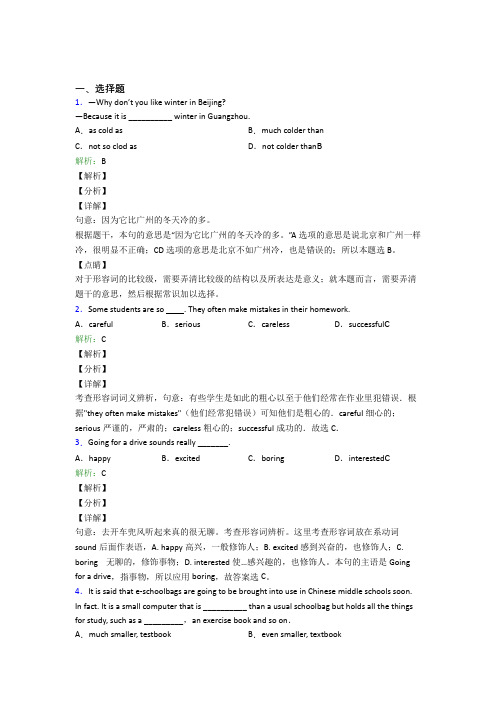
一、选择题1.—Why don’t you like winter in Beijing?—Because it is __________ winter in Guangzhou.A.as cold as B.much colder thanC.not so clod as D.not colder than B解析:B【解析】【分析】【详解】句意:因为它比广州的冬天冷的多。
根据题干,本句的意思是“因为它比广州的冬天冷的多。
”A选项的意思是说北京和广州一样冷,很明显不正确;CD选项的意思是北京不如广州冷,也是错误的;所以本题选B。
【点睛】对于形容词的比较级,需要弄清比较级的结构以及所表达是意义;就本题而言,需要弄清题干的意思,然后根据常识加以选择。
2.Some students are so . They often make mistakes in their homework.A.careful B.serious C.careless D.successful C解析:C【解析】【分析】【详解】考查形容词词义辨析,句意:有些学生是如此的粗心以至于他们经常在作业里犯错误.根据"they often make mistakes"(他们经常犯错误)可知他们是粗心的.careful细心的;serious严谨的,严肃的;careless粗心的;successful成功的.故选C.3.Going for a drive sounds really _______.A.happy B.excited C.boring D.interested C解析:C【解析】【分析】【详解】句意:去开车兜风听起来真的很无聊。
考查形容词辨析。
这里考查形容词放在系动词sound后面作表语,A. happy高兴,一般修饰人;B. excited感到兴奋的,也修饰人;C. boring 无聊的,修饰事物;D. interested使…感兴趣的,也修饰人。
- 1、下载文档前请自行甄别文档内容的完整性,平台不提供额外的编辑、内容补充、找答案等附加服务。
- 2、"仅部分预览"的文档,不可在线预览部分如存在完整性等问题,可反馈申请退款(可完整预览的文档不适用该条件!)。
- 3、如文档侵犯您的权益,请联系客服反馈,我们会尽快为您处理(人工客服工作时间:9:00-18:30)。
代词【考点直击】1. 人称代词主格、宾格形式及其主要用法;2. 名词性物主代词与形容词性物主代词的形式、区别及其主要用法;3 反身代词的形式、意义及其主要用法;4 常见不定代词的一般用法;5. 指示代词的一般用法,并了解其在上下文中的指代用法;6. 相互代词的基本用法;7. 疑问代词的基本用法。
8. 关系代词的基本用法。
【名师点睛】代词是代替名词、形容词和数词的词。
按其意义、特征及其在句中的作用分为:人称代词、物主代词、指示代词、反身代词、相互代词、疑问代词、不定代词和关系代词等。
一. 人称代词1.人称代词的人称、数和格,如下表所示。
I we you she he it theyme us you her him it themmy our your her his its theirmine ours yours hers his its theirs2.人称代词有主格和宾格之分。
通常主格作主语,宾格作宾语。
如:3.人称代词还可作表语。
作表语时用宾格。
如:4.人称代词在than之后与其他人或事物进行比较时,用主格和宾格都可以。
如:二. 物主代词1.表示所有关系的代词叫物主代词。
物主代词分形容词性物主代词和名词性物主代词,如下表所示。
见上表2. 形容词性物主代词的作用相当于形容词,可在句中作定语。
例如:3. 名词性物主代词的作用相当于名词,在句中可用作主语、宾语和表语。
三. 指示代词指示代词包括:this,that,these,those。
1. this和these一般用来指在时间或空间上较近的事物或人,that和those则指时间和空间上较远的事物或人,例如:2. 有时that和those指前面讲到过的事物,this 和these则是指下面将要讲到的事物,例如:3. 有时为了避免重复提到的名词,常可用that或those代替。
4. this 在电话用语中代表自己,that 则代表对方。
四. 反身代词英语中用来表示"我自己","你自己","他自己","我们自己","你们自己"等意义的代词称为反身代词,也有人称之为自身代名词,其形式如表所示。
myself ourselves yourself yourselves herself himself itself themselves反身代词可以在句中作宾语,表语,同位语。
1. 作宾语,表示动作的承受者就是动作的发出者,主语和宾语指同一个人或一些人。
2. 作表语。
3. 作主语或宾语的同位语,表示亲自或本人。
五. 不定代词不是指明代替任何特定名词的代词叫做不定代词,在句中可作主语、表语、宾语和定语。
现将几个常用的不定代词举例说明如下:1. some与any的区别2. few, a few, little, a little在用法上的区别1)用作形容词:2)a little和little也可以用作副词,a little表示“有点,稍微”,little表示“很少”。
I'm a little hungry. (修饰形容词hungry)3. other, the other, another, others, the others的区别。
1)other可以作形容词用,后面可以跟单数或复数名词,意思是“其他的、别的”。
4. every与each的区别。
5. all和both的用法。
1)all指三者以上,或不可数的东西。
谓语动词既可以用单数,也可以用作复数。
在句中作主语、表语、宾语、同位语和定语。
2)both作代词。
六. 相互代词表示相互关系的代词叫做相互代词。
相互代词有each other 和one another两种形式。
在当代英语中,each other和one another没有什么区别。
相互代词可在句中作宾语,定语。
作定语用时,相互代词用所有格形式。
七. 疑问代词疑问代词有who,whom,whose,what和which等。
疑问代词用于特殊疑问句中,一般都放在句首,并在句子中作为某一句子成分。
八.关系代词关系代词是一种引导从句并起连接主句和从句作用的代词。
关系代词有 who, whose, whom, tha t, which. 它们在句中可用作主语,表语,宾语,定语. 在主句中,它们还代表着从句所修饰的那个名词或代词。
【实例解析】1.Mary, please show______ your picture.A. myB. mineC. ID. me答案:D。
该提考查的是人称代词和物主代词的用法。
在本题中,动词show的后面要跟双宾语,空白处缺少一个间接宾语,所以应选me。
2. ---What’s on TV tonight? Is there _________ interesting?---I’m afraid not.A. somethingB. anythingC. nothingD. everything答案:B。
该提考查的是不定代词的用法。
这是一个疑问句。
在疑问句中,通常用anything。
3. ________ of them has his own opinion.A. BothB. SomeC. EveryD. Each答案:D。
该题考查的是不定代词用法。
因为谓语动词是单数形式,所以Both和Some都不对。
Every 不能作主语,所以只有Each合适。
4.---Where is my pen?---Oh, sorry. I have taken _______ by mistake.A. yoursB. hisC. mineD. hers答案:A。
该题考查的是物主代词的用法。
根据题干的背景,我们可以判断出错拿的钢笔应该是对方的,所以选yours。
【中考演练】一. 单项填空1. Tom, Please pass ________ the glasses. I want to read the newspapers.A. yo uB. meC. himD. her2. The English novel is quite easy for you. There are ______ new words in it.A. a littleB. littleC. a fewD. few3. ---You want ________ sandwich?---Yes, I usually eat a lot when I’m hungry.A. otherB. anotherC. othersD. the other4. The doctors and nurses are doing their best to fight SARS. They think more of others than _______.A. theyB. themC. themselvesD. theirs5. ---Which do you prefer, a bottle of orange or a bottle of milk?---______________, thanks. I’d like a cup of tea.A. EitherB. NeitherC. BothD. None6. ---Oh! I came in a hurry and forgot to bring food.---Never mind. You can have ________.A. usB. oursC. youD. yours7. ---Can I come this evening or tomorrow morning?---_______ is OK. I’m free to day and tomorrow.A. EitherB. NeitherC. BothD. None8. ---How are you going to improve _______ this term?---Work harder than last term.A. ourselvesB. myselfC. himselfD. yourself9. ---Could you tell me _______ she is looking for?---Her cousin, Susan.A. thatB. whoseC. whoD. which10. ---Is _______ here?---No. Li Lei and Han Mei have asked for leave.A. everybodyB. somebodyC. anybodyD. nobody11. Paul has _______ friends except me, and sometimes he feels lonely.A. manyB. someC. fewD. more12. If you want to book a round-trip ticket, you’ll have to pay ______ $ 30.A. moreB. otherC. the otherD. another13. ---Do you live by yourself, Mr Wang?---Yes. I have two sons. But ______ of them lives with me. They are now studying in America?A. neitherB. bothC. noneD. either14. ---Have you sent your parents an E-mail telling them you arrived safe?---No. _______ of them can use a computer.A. NoneB. BothC. NeitherD. All15. Who taught _______ English last term? Was _____ Mr. Smith?A. you; itB. you; heC. your; itD. your; that16. ---That woman has a bag in her right hand. What’s in her _____ hand?A. anotherB. othe rC. oneD. the other17. We decided to go for a field trip with some friends of _______.A. usB. ourC. oursD. ourselves18. ---Is there a bus to the zoo?---I’m afraid there’s _______ bus to the zoo.A. noB. anyC. someD. none19. You forgot your dictionary? You may have _______.A. meB. myC. mineD. myself20. This is ______ classroom. Where is _______?A. our; themB. us; theyC. our; theirsD. ours; theirs二. 用所给代词的适当形式填空1. This is not my pencil-box. _______ ( I ) is in the bag.2. Trees are planted in ______ ( we ) country every year, which makes our country more and more beautiful.3. ---Is that bike Miss Gao’s?---Yes, it is ______(she) . Beautiful, isn’t it?4. Help ______ (you) to some fruit, Jack.5. ---Who taught your brother to surf?---Nobody. H e learnt all by _______ (he).6. Their English teacher is from America, but ______ (we) is from England.7. Mary’s answer is different from ________ ( I ).8. ---My watch keeps good time. What abou t _______(you)?---Mine? Oh, two minutes slow.9. Sam is my brother. Do you like to play with ______ (he)?10. Did you enjoy _______ (you), Mary and Kate?三. 用适当的代词填空1. The old man has two sons. One is a worker, _______ is a teacher.2. Students are usually interested in sports. Some like running; some like swimming; _______ like ball games.3. Let’s go and have a drink. We’ve got _______ time before the train leaves.4. We were all very tired, but _______ of us would like to have a rest.5. ______ of the twins are in our class.6. Boys, don’t touch the machines, or you may hurt _______.7. It is said there is going to be ________ important in the CCTV news.8. We couldn’t buy anything because _______ of the shops opened at that time.9. They didn’t lea rn _______ new in this lesson.10. ---Why is ______ easy for such a young girl to learn three foreign languages so well?---Because Britain, Germany and France are all very near ______ country.四. 用适当的疑问代词和关系代词填空1. ______ is the population of the world today?2. _______ jumped the longest of all in the long jump?3. --- _______ colour is your mother’s dress?---It’s black.4. ---______ is your car?---The red one in front of the tree.5. ---______ of the following can you often find on a medicine bottle?---I know, sir. It’s instruction.6. The necklace ______ she is wearing is beautiful.7. Do you know the person _______ l ost his bike?8. Most people _______ live in less developed countries are quite poor.9. The boy ______ is helping the old man is Joh n’s brother.10. People ______ use credit cards to buy things online should be very careful【练习答案】一. 1.B 2.D 3.B 4.C 5.B 6.B 7.A 8.D 9.C 10.A 11.C 12.D 13.A 14.C 15.A 16.B 17.C 18.A19.C 20.C二.1.Mine 2.our 3.hers 4.yourself 5.himself 6.ours 7.mine 8.yours 9.him10.yourselves三. 1..the other 2.others 3.a little 4. none 5.Both 6.yourselves 7.something 8.none9.anything 10.it; her四. 1. What 2. Who 3. What 4. Which 5. Which 6. that/ which 7. that/ who 8. who/that9. who/ that 10. who/ that。
